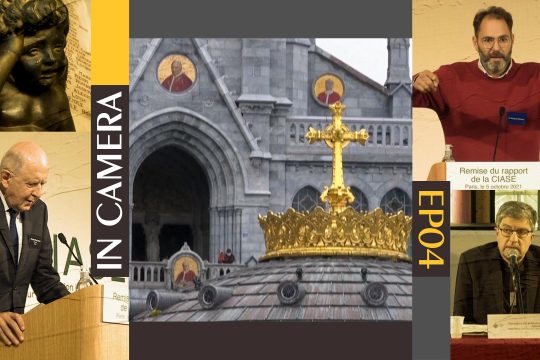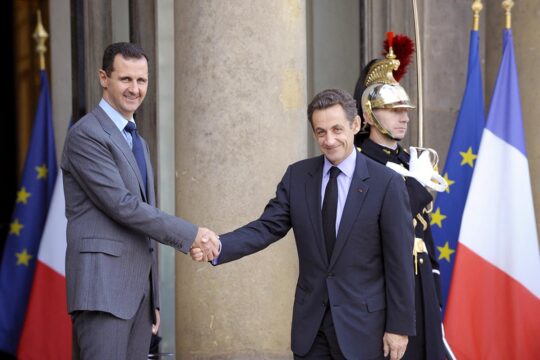"I feel like I threw a bottle into the sea; it will get somewhere... or not,” says Mireille. She was one of the first to send an email, on January 28, 2022, reporting herself as a victim to the Independent National Instance for Recognition and Reparation (INIRR), launched at the initiative of the French Bishops' Conference (CEF). Its creation was one of the recommendations of the Independent Commission on Sexual Abuse in the Church (or "Sauvé Commission" after its president), which revealed on October 5, 2021, that more than 216,000 young people had been sexually abused by a priest or clergyman in France since 1950.
The INIRR is for victims of priests and laity within the Catholic Church, while the Commission for Recognition and Reparation (CRR) deals with abuse in congregations and institutes. At 72 years of age, and after welcoming the initiative of the Sauvé Commission, Mireille took the plunge and sought financial reparation for sexual abuse she suffered in the Church between the ages of 17 and 21. After 50 years of silence and a life of emotional turmoil, she has "opened the Pandora's box" of her past.
Mireille immediately received an email from INIRR confirming that she would be assigned a contact person. Three months passed, during which the INIRR sent several apologies for the slowness of the process. Then Mireille got a phone interview – lasting an hour and a half - with a designated person. She had already told her personal story to the Sauvé Commission. "During the telephone interview, I was asked to go into much more intimate details; it was a new light on a whole part of my past. At that moment, I realized the causes of the pain in my life," she says. After this exchange, which Mireille did not find very empathetic, she still found herself waiting. "I quickly asked this person to let me re-read the notes. Even the best therapist can, in such a short time, misunderstand things, and I needed to be reassured. But when I didn't get an answer, my anxiety rose. How will what I've told be translated into my file, what are they doing with my story?"
Finally, at the end of August, the INIRR finally sent her file to be re-read. She was assured that the group of 12 experts would rule on her request. Since then, she has been waiting to know when her file will be submitted to the experts.
"A real bottleneck”
There are many testimonies like Mireille’s among the victims who have contacted the INIRR. Marie Derain de Vaucresson, a lawyer specializing in children's rights, is the president of the Instance and has acknowledged the criticism. In a letter sent to the victims by email on September 1, she explained: "We understand completely your impatience to be contacted by a designated person. You will understand that the constitution of the entire INIRR team is a little slower than expected, which explains why your contact person has not yet been designated." Of the 784 victims of paedophilia who have applied to the body, 48 had reached the end of the procedure by September 6. As of July 10 the Selam Fund, a fund for solidarity against sexual abuse of minors, which awards financial compensation decided by the INIRR, had compensated six victims.
With the INIRR frequently criticized for lack of professionalism, its volunteer president admits that she was overwhelmed. "After the first press conference on February 24, we went from less than 100 cases for processing to 500 in a few days,” she told Justice Info. “And to more than 300 the day after the June 1 conference. This is a real bottleneck. The reason for our delay is that we have difficulty in recruiting competent contact people; in this uncharted alternative justice procedure, we do not have people who are immediately competent in terms of listening and minimum knowledge in psychological trauma."
Marie Derain de Vaucresson says she wants to double her staff by the end of the year, hiring a secretary general and a coordinator as well as contact people. The INIRR has a budget of a little more than 500,000 euros, financed by the Union of Diocesan Associations of France.
"An inexcusable delay”
"This delay is inexcusable,” says Olivier Savignac of the victims' collective Parler et Revivre. “What we, the victims, expect is a real process of support. By constantly postponing the deadlines, the Instance has created hopes, expectations, and above all additional injustices. For me, that is just not tenable.
"Our association has become the after-sales service of the INIRR," continues this spokesman who finds himself having to daily reassure victims waiting for reparations. Under pressure from the associations, Marie Derain de Vaucresson has therefore recently committed herself to ensuring that a first telephone contact is quickly established with each person who contacts INIRR.
Olivier Savignac thinks the delays are due to unpreparedness upstream. "Not enough time was taken to train people, both contact people and commissioners, who are up to the challenge. Victims could have waited a little longer, as long as things were set up properly,” he says. The INIRR president responds that they have been caught up in time management issues. "Indeed we could have taken eight months or a year just structuring the Instance,” she says, “but imagine how the victims would have felt if, a few weeks from the anniversary the Sauvé report, the INIRR had not yet received and supported victimized people."
Opacity in calculating compensation
The same is true for the victims of religious congregations who have claimed compensation before the CRR. As of September 19, out of 400 cases submitted, only about 30 had been finalized. While Vivien (pseudonym) considers himself rather lucky with the way his case was handled - which involved a very detailed questionnaire and not an interview -, there are certain points that he questions. The main one concerns the way in which the compensation rates were established. "A few days before September 7 when my file went through the commission, Pierre Hazan (one of the 12 commissioners) called me and told me: for your case, we are going to ask for compensation of 40,000 euros, does that suit you?”
Considering that he was not in a position to evaluate the harm he had suffered, Vivien accepted. He mentions another victim in the process of receiving 28,500 euros. "Why such a precise sum and not 27,000 or 29,000 euros?” he asks. “What was the method of calculation used? We need some clarity on how things are decided in both commissions."
This criticism was reiterated by François Devaux, founder of the victims' association La parole libérée, who points out that victims were informed of the financial scales through the press. "I understand what the victims are saying,” responds CRR president Antoine Garapon, “but many of them have been informed of our procedures, because we work directly with victims' associations. We are transparent, we ask victims to evaluate their prejudice according to very precise criteria in the questionnaire." While the Commission does not speak of scales but of "personalized and rationalized reparation", a common maximum for the INIRR is 60,000 euros and the average paid to the few victims who have already been compensated is 32,200 euros. For a rape, this is higher than what the French courts currently award, says Garapon, whose task as stated in the questionnaire sent to the victims is "to repair irreparable harm”.
Towards restorative justice
"What we are putting in place is unprecedented. It’s a matter of individualizing responses and proposing an original course of reparation," explains Marie Derain de Vaucresson, who speaks of "restorative justice". "Requests for financial reparation are not the only requests. For 48 decisions rendered, 30 have a financial dimension," she continues.
Antoine Garapon, who knows transitional justice issues well, draws the first conclusions from his year at the head of the CRR: "I believe that the CRR is there to render justice. This does not necessarily mean money, but always words and explanations. There is a path for victims that begins with amnesia, then anger, and ending with painful memory, but that allows us to move forward." Indeed, the magistrate makes it a point to ensure that each victim has contact with the congregation in question and, when possible, a meeting. "There are people who say they don't want to hear any more about it, but in general, when they agree to meet with the congregation, things are already better," continues the CRR president.
For example in addition to financial reparation, Vivien was able to have an exchange, outside Paris and in the presence of a commissioner, with the Jesuit congregation within which was the perpetrator of the sexual abuse he suffered. "I also asked that near the school where I was - now destroyed - a plaque be posted mentioning the abuse of young boys and that, in my other school, the former director's office be transformed into a 'memorial' room," Vivien explains.
The challenge for these commissions is to take into account the collective dimension of restorative justice. "Reparation of victims of the Church must not remain between two people, the victim and the perpetrator,” affirms the INIRR president. “The whole of society is concerned, and it is also a sign of the Church’s maturity to provide strong support."
But before addressing the whole society, those most concerned – the victims – need to be supported. One year after the shock publication of the Sauvé Report, victims' groups will gather in Paris on October 8, in the presence of Jean-Marc Sauvé. Olivier Savignac, who initiated the event, says the objective is "to finally make known in the public arena the possibility for thousands of people to bear witness and ask for reparation”. Hopefully under better conditions.
TWO INDEPENDENT BODIES
The Independent National Instance for Recognition and Reparation (INIRR), created by the French Bishops' Conference, supports victims of sexual violence by a member of the clergy (priest, deacon, etc.) or lay person on a mission for the Church (staff or volunteer in a service, a school, or a movement of the Catholic Church).
Each victim who comes forward is assigned a contact person with whom he/she obtains between one and three personalized interviews. A college of 12 experts (made up of specialists in care, law, medical and social services and a victim priest specialized in accompanying victims of abuse) then decides on the request for financial compensation, awarded by the Selam Fund.
Three scales of seriousness have been established. The first evaluates the seriousness of the acts of sexual violence committed; the second the seriousness of the Church’s "failures"; and the third "the seriousness of the consequences on health" (physical, mental and social) on a level from 1 to 10.
- 784 cases in progress
- 48 cases finalized
The Commission for Recognition and Reparation (CRR), created by the Conference of Monks and Nuns of France, deals with abuses perpetrated in religious congregations and institutes. It is an association under the law of 1901, which currently has three employees, an intern and a volunteer president.
A questionnaire is sent to each victim, who must answer precise questions concerning personal life, emotional life, family relationships, social and professional life, spiritual life, and evaluate the harm suffered on a scale from 1 to 7.
- 400 files in progress
Approximately 30 finalized (the victims concerned by financial reparation – mostly applied for -- quickly received compensation from the congregation implicated in the sexual abuse).








